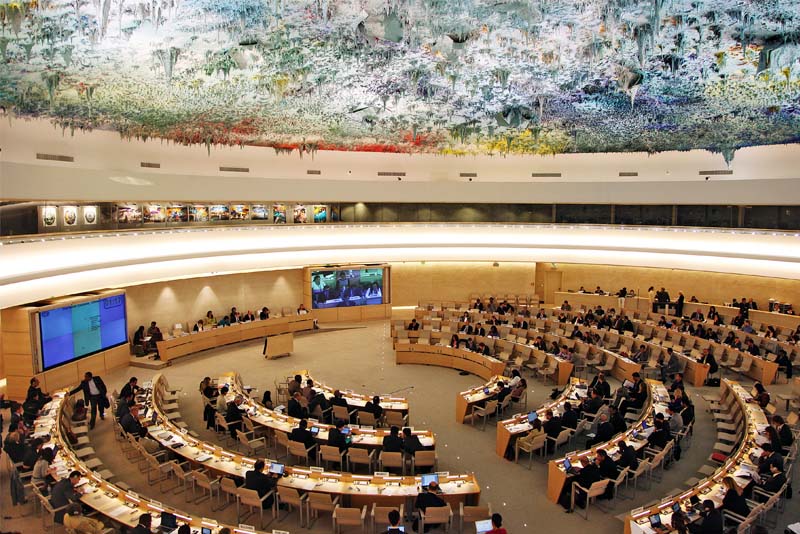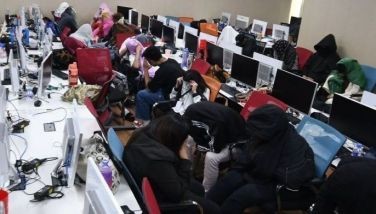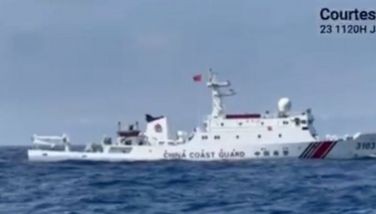HRW official: Philippines should expect more international scrutiny of drug war

Seat of the United Nations Human Rights Council in Geneva UN Brief Photo/File
MANILA, Philippines — The Philippines should expect greater international involvement and scrutiny if it continues to ignore concerns over Manila's "murderous war on drugs," according to an official of Human Rights Watch in Geneva.
John Fisher, the advocacy director of the human rights watchdog in Geneva, Switzerland, said that the Philippines could see investigations by United Nations-appointed probers and special rapporteurs to look into the mounting number of drug-related killings in the country if would not take sufficient steps to stop these deaths and to hold people to account.
Aside from the visits of probers from the international body, the bilateral relations of Manila with some countries could also be affected as more and more states express their concern over human rights violations in the name of President Rodrigo Duterte's war on drugs, Fisher noted.
Economic sanctions can also be imposed, but these depend on individual nations, according to Fisher, as he called on the government and Duterte to end violence and impunity in their campaign to eradicate narcotics in the country.
"If the government continues to reject and deny that there is extrajudicial death and the president continues to reinforce the calls for these kinds of killings, I think we will seen an increase of strong measures at the United Nations," Fisher told Philstar.com in an interview over the weekend.
The International Criminal Court can also step in as HRW and some nations think that the spate of killings of drug suspects amounts to a crime against humanity, according to the official.
Human rights groups and workers claim that the Duterte's war on drugs has claimed between 7,000 to 12,000 lives since its start last year.
However, the government disputes this and claims a much lower figure, noting that many of the so-called extrajudicial killings are still being investigated.
According to Fisher, since Manila has already signaled that it will not take adequate measures to end the crisis by rejecting the practical recommendations of countries that will essentially put a stop to the killings, the Philippines should expect a "graduated increase in steps" to hold officials and people accountable.
Fisher stated that it's the responsibility of the international community to ensure that the international law is "complied with" and many tools are available at its disposal.
The Philippines recently rejected 154 of the record 257 recommendations by UN member-states to help the country address the rising number of alleged extralegal killings, saying that the suggestions were "sweeping, vague and even contradictory" especially in the context of its democratic processes.
READ: UPR: Fast facts on the UN review of Philippine human rights
Fisher said that this rejection showed that government officials were not serious in addressing the issue which has alarmed both local and international human rights groups and advocates.
"If the government were in fact sincere about investigating the deaths and holding people to account, it would not have rejected those UPR recommendations calling for exactly that," he said.
Fisher said that most of the recommendations that the Philippines rejected were those that could make a "practical real difference" and end the drug-connected killings.
"[I]f you look at which ones the Philippines rejected, it was all of the most fundamental ones about ending violations of the right to life," he said.
It also could not use its acceptance of 103 of the recommendations as proof that it was taking steps to uphold the human rights situation in the country, he said.
Fisher stated that it was "quite extraordinary" for 39 countries to respond to Manila's rejection of more than half of the recommendations.
He said that this was a "very, very strong message" from these nations that they were not satisfied with Manila's response to calls to address their concerns, to end violence and to hold those responsible accountable.
These nations felt that the Duterte government's answer was inadequate, Fisher said.
Iceland, reading a statement on behalf of 38 countries, expressed concern over drug-connected killings in the country and urged the government to take steps to end and investigate these.
The 39 signatories represented an increase from the 32 nations which signed on a similar statement delivered at the Human Rights Council in June.
It was also incorrect for government officials to claim "victory" UN Human Rights Council following the body's adoption of its report, according to Fisher, saying that all reports are accepted and adoption simply means that the process has been completed.
The investigation of the Philippine National Police of drug-related deaths has also been inadequate, according to Fisher, as he noted the dismal pace and record of the probe so far.
"How many people have been held accountable or prosecuted as a result of these killings? I think that the number is about zero," he said sardonically.
Fisher said that the Philippine government should heed the calls of concern of the international community and treat these, not as a form of denunciation, but as an invitation to the country to respect its international human rights obligations.
The government's recent statement to UN Secretary General Antonio Guteres that the Philippine government was ready to accept a human rights probe was a welcome development, according to Fisher.
However, he noted that it remains to be seen if the Philippines will honor this pledge to the UN secretary general.
"The government is feeling the pressure, and it has to be seen to be saying the right things if not doing them. We would challenge the government to stand by its commitment to the sec gen to allow UN monitors into the country," he said.
He added that the government should not be afraid of these investigators if it was not really involved in the killings.
- Latest
- Trending































